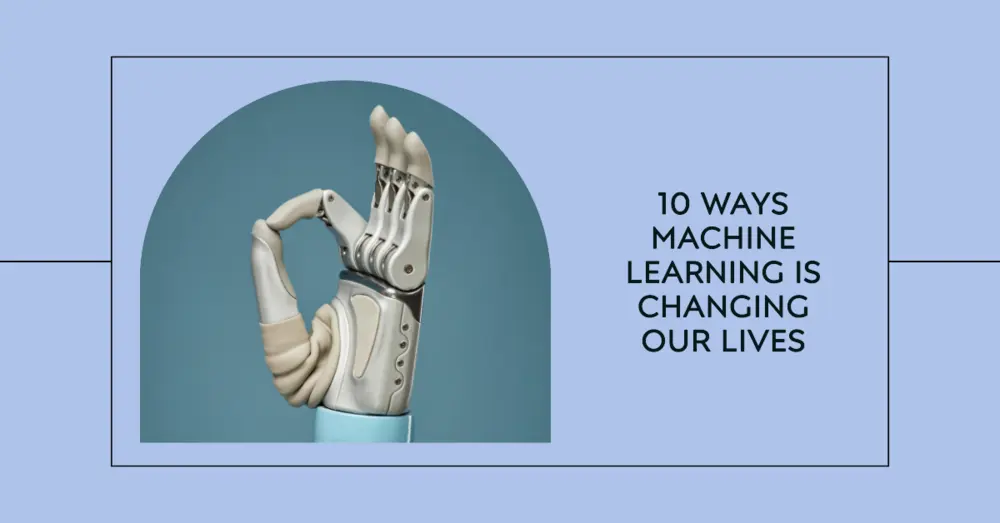Machine learning, a branch of artificial intelligence, impacts our daily lives in various ways. It’s the technology behind personalized recommendations on streaming platforms and social media. It powers virtual assistants like Siri and Alexa, making them understand and respond to our voice commands. In healthcare, machine learning aids in disease diagnosis and predicts patient outcomes. Financial institutions use it for fraud detection, ensuring our transactions are secure. Machine learning also enhances transportation with route optimization and self-driving cars. It’s used in language translation, making the world more accessible. E-commerce platforms use it for product recommendations, and it’s even present in agriculture for crop management.
Top 10 Uses of Machine Learning in Our Daily Lives
Let us find out some interesting uses listed the data scientists of the best data science company in India –
Recommendation Systems
They are sophisticated applications of machine learning that behaviour user behaviour and preferences to offer personalized content or product suggestions. These systems thrive in various industries, from streaming services like Netflix and Spotify to e-commerce giants like Amazon. They leverage algorithms to mine extensive datasets, identifying patterns and correlations in user interactions, such as clicks, purchases, and ratings. By understanding individual tastes and interests, recommendation systems enhance user experiences by presenting relevant content or products, ultimately driving engagement and sales. These systems exemplify how machine learning transforms the way we discover entertainment, products, and information in our interconnected digital world.
Virtual Assistants
They are powered by machine learning and natural language processing, have revolutionized how we interact with technology. These AI-driven entities, such as Siri, Alexa, and Google Assistant, understand and respond to voice commands, making tasks more convenient and efficient. They schedule appointments, provide weather updates, answer questions, control smart devices, and even offer entertainment. Virtual assistants continuously learn from user interactions, adapting to individual preferences and improving their accuracy over time. Their integration into smartphones, smart speakers, and other devices has transformed how we manage our daily routines, fostering a hands-free, voice-activated future where information and assistance are just a spoken word away.
Social Media
It plays an important role in social media by powering recommendation algorithms and content personalization. It continuously analyzes user interactions, preferences, and behaviors to curate personalized newsfeeds, suggesting posts, videos, and advertisements tailored to individual interests. These algorithms enhance user engagement, keeping us connected and entertained on platforms like Facebook, Instagram, and Twitter. Additionally, it is instrumental in content moderation, flagging and removing inappropriate or harmful content, ensuring a safer online environment. It also assists in analyzing sentiment and trends, providing valuable insights for businesses and marketers to refine their strategies and connect with their target audiences effectively.
Online Advertising
It revolutionizes online advertising by leveraging vast datasets and complex algorithms to optimize ad targeting. It analyzes user behavior, preferences, and interactions to deliver highly personalized and relevant ads. Through real-time bidding and auction mechanisms, machine learning determines the ideal ad to display for each user, maximizing click-through rates and conversion probabilities. Advertisers benefit from improved ROI as their campaigns reach audiences more likely to engage with their products or services. Simultaneously, users experience a more tailored and enjoyable online experience, as they encounter ads aligned with their interests and needs, fostering a mutually beneficial ecosystem in the digital advertising landscape.
Healthcare Diagnostics
It revolutionizes healthcare diagnostics by harnessing its ability to analyze vast medical datasets with incredible precision and speed. It aids medical professionals in identifying diseases and conditions accurately by processing diverse data sources, including medical images like X-rays, MRIs, and CT scans. Through pattern recognition and anomaly detection, machine learning systems can spot subtle signs and early-stage diseases that might be missed by the human eye. This results in quicker and more reliable diagnoses, leading to timely treatment interventions, improved patient outcomes, and a significant advancement in the field of healthcare, ultimately saving lives and reducing the burden on healthcare resources.
Autonomous Vehicles
It is a basic part of independent vehicles, empowering them to explore, see their environmental elements, and pursue continuous choices. These vehicles use progressed calculations to deal with information from different sensors, including cameras, lidar, radar, and GPS, to grasp their current circumstance. Machine learning models break down this information to distinguish and group objects, foresee passer-by conduct, and expect street conditions. Through ceaseless learning, these frameworks adjust to evolving situations, working on their driving capacities over the long run. Machine learning in independent vehicles guarantees more secure and more effective transportation by limiting human blunder and upgrading the capacity to deal with complex driving situations, at last forming the eventual fate of portability.
Language Translation
It plays a crucial role in language translation by powering advanced translation systems like Google Translate. These systems employ neural machine translation, a subset of machine learning, to process vast amounts of multilingual text data. Through training on parallel texts in multiple languages, machine learning models learn to understand context, grammar, and semantics, enabling them to accurately translate text from one language to another. This technology has revolutionized communication by providing quick and accessible language translation services, bridging linguistic gaps and facilitating global interactions in real-time, whether it’s for travel, business, or connecting with people from diverse linguistic backgrounds.
Fraud Detection
It is a powerful tool for fraud detection in financial and e-commerce industries. By analyzing vast datasets of transaction history and user behavior, machine learning algorithms can identify suspicious patterns and anomalies indicative of fraudulent activity. These models learn to distinguish normal transactions from fraudulent ones, adapting and improving their accuracy over time. They enable real-time monitoring, quickly flagging potentially fraudulent transactions for review or automatic action, thus minimizing financial losses and protecting consumers and businesses alike. Machine learning’s ability to handle large volumes of data and detect subtle irregularities makes it an indispensable component in the ongoing battle against financial fraud.
Smart Homes
It plays a pivotal role in transforming houses into smart homes. It empowers devices and systems within the home to learn and adapt to occupants’ preferences and needs. Smart thermostats, for instance, utilize machine learning to analyze temperature patterns and user behavior, adjusting heating or cooling to maximize comfort and energy efficiency. Security systems leverage facial recognition and motion detection algorithms, distinguishing between authorized and unauthorized individuals, enhancing safety. Furthermore, machine learning enhances voice-controlled assistants and automates routine tasks, making everyday life more convenient and efficient. In essence, machine learning makes smart homes not just connected but also intelligent, catering to residents’ changing demands.
Content Creation
It revolutionizes the way we generate written material. Advanced models like GPT-3 can analyze vast datasets and generate human-like text, including articles, reports, and creative works. By understanding context and patterns, these algorithms produce coherent, contextually relevant content, saving time for writers and marketers. They can also assist in multilingual translation and paraphrasing tasks, ensuring content remains engaging and accessible to diverse audiences. Machine learning-driven content creation not only enhances productivity but also opens new possibilities for automating routine writing tasks, freeing up human creativity for more strategic and impactful endeavors.
Summing Up
In summary, it seamlessly integrates into our routines, streamlining tasks, and elevating our daily experiences. It is a subset of artificial intelligence, profoundly influences our daily lives. Based on the recent experience of the best machine learning company in India, it is going to change the future of human for sure.



